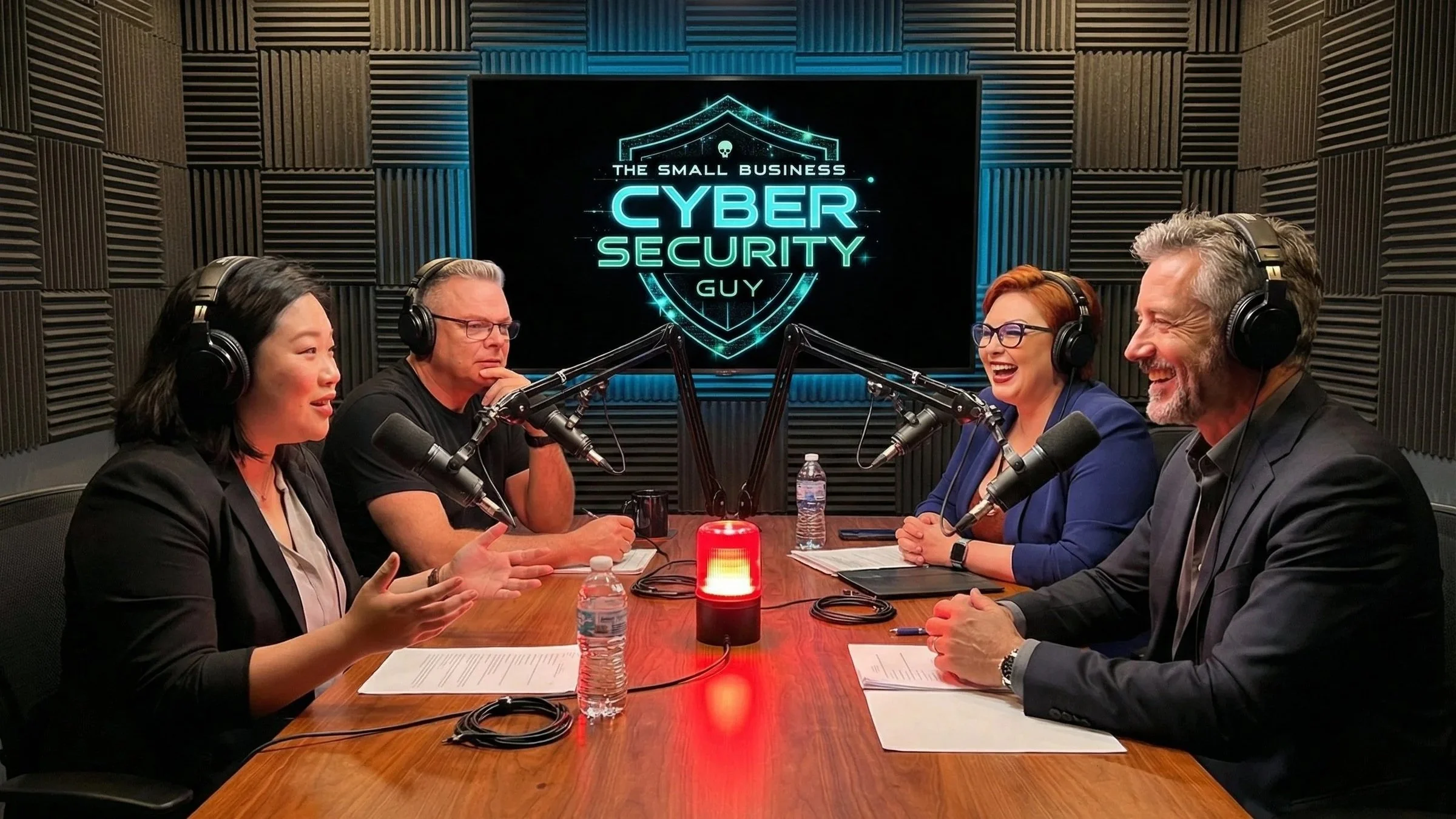⭐100K+ Monthly Downloads
⭐Top 20 Apple Management
⭐100K+ Monthly Downloads ⭐Top 20 Apple Management
The Small
Business
Cyber Security Guy
Welcome to the blog and podcast, where we share brutally honest views, sharp opinions, and lived experience from four decades in the technology trenches. Whether you're here to read or tune in, expect no corporate fluff and no pulled punches.
Everything here is personal. These are my and the team’s thoughts, opinions forged in the heat of battle! And not those of our employers, clients, or any other professional with whom we are associated.
If you’re offended, take it up with us, not them.
What you’ll get here (and on the podcast):
Straight-talking advice for small businesses that want to stay secure
Honest takes on cybersecurity trends, IT malpractice, and vendor nonsense
The occasional rant — and yes, the occasional expletive
War stories from the frontlines (names changed to protect the spectacularly guilty)
I've been doing this for over 40 years. I’ve seen genius, idiocy, and everything in between. Some of it makes headlines, and most of it should.
This blog and the podcast are where we break it all down.
Grab a coffee and pull up a chair, you need to see this!
ISO27001 vs Cyber Essentials (Part 2/3):Big Names, Big Certs, Big Breaches: The Truth Behind the Logos
You’d think ISO27001 and SOC 2 certifications mean a business is secure. But if 2023 and 2025 have shown us anything, it’s that those badges don’t stop breaches. From Capita’s data leaks to Harrods’ containment chaos, and Co-op’s app disruption to the MOVEit dominoes, governance frameworks have failed where basic cyber hygiene would have succeeded.
Cyber Essentials, often dismissed as small business fluff, turns out to be the missing frontline control in all of these high-profile failures. This article names names, unpacks the gaps, and shows why CE+ is no longer optional, it's essential.
ISO27001 vs Cyber Essentials (Part 1/3): Why They’re Not the Same and Why That Matters More Than Ever
Think Cyber Essentials and ISO27001 are just different flavours of the same thing? Think again. One’s a tactical shield against everyday threats, the other’s a strategic blueprint for governance. Mistake one for the other, and you’ll either overspend or leave the door wide open.
This article rips into the dangerous misconception that they’re interchangeable, explores how Cyber Essentials is built for every organisation, from startups to schools, and why it remains your frontline defence while ISO27001 governs the back office. Ignore this and you risk joining the breach statistics next quarter.
Ransomware Isn’t the Disease. It’s Just the Symptom.
Ransomware isn’t your biggest problem—it’s just the one that finally made you look. Behind every cyberattack sits a decade of crap decisions, from budget-stretched IT to untrained staff, weak passwords, and clueless suppliers.
You didn’t get hit because you were unlucky. You got hit because your house was already on fire.
This is part one of a blistering three-part series breaking down the disease beneath the ransomware epidemic ripping through the UK’s small business sector.
If you think you’re too small to be a target, read this—and pray you’re not already infected.
May 2025 Patch Tuesday: Microsoft Preps Fixes for Broken Logins, Missed Patches, and Security Chaos
May’s Patch Tuesday is coming in hot—and if April’s mess left your domain logins broken, WSUS deployments in meltdown, or your Hello PIN sulking in the corner, you’ll want this one.
Microsoft is set to mop up its authentication chaos, plug lingering Windows 10 holes, and squash a few zero-days while it’s at it.
But that’s not all. Adobe, Intel, and SAP are sneaking in updates too. This month’s patch drop might not be as noisy as April, but it’s arguably more important.
Brace yourself for impact on 14 May—and don’t forget to test before clicking “Install.”
UK Legal Aid Agency Breach: Cybersecurity Incompetence Meets Supply Chain Chaos
The UK Legal Aid Agency has been hit by a serious cybersecurity incident—and the fallout could be catastrophic.
With over 1.5 million legal aid cases a year and £2.3 billion in funding flowing through its systems, sensitive data from criminal, immigration, and abuse cases could now be in the hands of cybercriminals.
Was it a supply chain failure? A government screw-up? (Spoiler: probably both.) If you thought justice was blind, wait until you see how blindfolded their cybersecurity really was. Here's everything they’re not telling you—yet.
EU Bans SIM Farms – Years Too Late, As Usual
The EU has finally banned SIM farms — about five years after scammers used them to turn SMS networks into a cybercrime playground. Bravo. This industrial-scale abuse wasn’t exactly a secret, yet regulators somehow needed a multi-year nap before acting.
Businesses were battered, individuals scammed, networks flooded and now, just as criminals are moving onto bigger, nastier tricks, the ban lands with all the urgency of a snail on sedatives.
It’s the right move, just years too late. If this is what "proactive" cybersecurity looks like, we might all want to invest in stronger helmets.
Breached (Part 4)
Think your MSP has your back? Think again. In Part 4 of Breached, we unpack the brutal truths most businesses only learn after the worst happens.
From useless logs to skyrocketing insurance, and a support ticket that nearly destroyed everything, this is the roadmap you wish you had before the call came. Ten hard lessons, zero fluff.
Why your MSP is there to sell, not protect. Why a good fractional CIO is worth their weight in gold. And why silence from your IT provider isn’t just dangerous—it might be deliberate. This isn’t theory. It’s survival. And you’d better be ready.
The Soft Underbelly: How UK SMBs Are Screwing the Nation on Cybersecurity
Think you're too small to be a target? Think again. UK small businesses are now the top attack vector for state-backed hackers from Russia and China, and your half-baked cybersecurity is a red carpet to our critical infrastructure.
M&S, Harrods, and the Co-op didn’t get hit by chance, they got hit through you. If you’re in the supply chain without Cyber Essentials Plus, real EDR, or even basic patching, you’re not just vulnerable — you’re a national liability. Time to grow up or get out of the way.
Breached (Part 3)
The breach was just the beginning. In Part 3 of Breached, the truth is out—and now come the consequences. The MSP tried to hide a misconfiguration. They failed.
Now the clients are calling, the regulators want answers, and the business owner is left holding the fallout. From a quiet boardroom to sleepless nights and rising insurance premiums, this is what happens when a cover-up gets exposed. Contracts are cancelled. Trust evaporates.
And the worst part? It all could have been prevented. If you've ever wondered what happens after the breach, this is the chapter that shows just how far it spreads.
Retail Cyber Crisis Uncovered: How the Co‑op Hack Is Just the Tip of the Iceberg
The Co-op breach? Just the start. Behind every checkout is a ticking digital time bomb—and UK retailers keep hitting snooze.
From Harrods to M&S, data is being leaked, stolen, and casually ignored while executives issue vague apologies and blame “sophisticated attacks.”
Payroll provider Zellis is quietly at the centre of it all—again. Meanwhile, your personal info is floating in the dark web like last season’s clearance stock.
In this brutal deep dive, we expose the rot behind the logos, the failures behind the firewalls, and ask the only question that matters:
Which high street brand is next?
Breached (Part 2)
What happens when your IT provider makes a mistake—and then tries to hide it? In Part 2 of Breached, a hidden support ticket, a missing firewall log, and over 400 unpatched vulnerabilities unravel a small business’s trust in the team meant to protect them.
The MSP said, “Don’t tell the client.” But she was accidentally copied in. What followed was seven days of denial, silence, and mounting pressure—until the truth was read aloud, word for word, in a boardroom gone cold. This isn’t about poor support. This is about betrayal, exposure… and what happens when you catch someone in the lie.
The SMS Scam: Why Your 2FA Strategy is an Open Goal for Hackers
Still using SMS for 2FA? You’re not securing your business—you’re leaving the door wide open and waving attackers in. A live zero-day exploit for SS7—the ancient, insecure telecom protocol still propping up your text messages—is being sold right now for five grand. That’s all it takes to intercept your logins, steal your bank codes, and track your phone. No malware.
No warnings. Just game over. If your IT team or MSP still thinks SMS is ‘good enough’, this article is the slap they need. Read it. Then rip SMS out of your security stack before someone else does it for you.
Breached (Part 1)
Katie Roberts thought it was just another Tuesday—until her personal phone rang at 11:27 a.m. The voice on the other end wasn’t a client. It was the National Crime Agency. Within minutes, her calm, structured world tilted on its axis. A cyber breach. Live. Real. Observed. And her business—the one she’d built from scratch—was now under threat. No plan. No warnings. Just a quiet office and a slow, sinking realisation that everything was about to change. What do you do when your worst-case scenario starts with a phone call? You listen. You freeze. And then… you start asking questions.
Co-op’s Data Breach: Another Day, Another Cyberattack in UK Retail
Co-op just confirmed a major data breach—but only after the hackers got sick of waiting and contacted the BBC themselves. Yes, really. It turns out customer data wasn’t just mishandled, it was gift-wrapped and forgotten like an expired loyalty card.
With Zellis—the same payroll firm linked to the BBC and BA MOVEit fiascos—once again in the mix, this breach isn’t just another blip.
It’s part of a growing pattern of retail cybersecurity disasters. And with legal and funeralcare data involved, the stakes are higher than most boardrooms seem willing to admit. So the real question is: who's next?
Samsung's Galaxy Wormhole: Yet Another Lesson in 'Trust But Verify'
Samsung has once again reminded us why blind trust is a cybersecurity death sentence. Researchers discovered a massive vulnerability in Galaxy devices' Secure Element — the hardware vault meant to protect your biometrics and encryption keys. Attackers could exploit this “inadvertent” flaw remotely, with Samsung quietly patching it months later and offering zero transparency.
No warnings. No device list. Just a silent fix and crossed fingers. If you own a Galaxy, you're now part of a grand experiment called cybersecurity roulette. Trust nothing. Verify everything. Then verify it again — especially when your vendor’s motto is basically “Oops, sorry!”
The Largest DDoS Attack of 2025 Hit an Online Betting Site With 1Tbps. Shocked? You Shouldn't Be.
Think 2025 would be the year we finally nailed DDoS protection? Think again. Some poor online betting site just got steamrolled by a 1Tbps brute-force attack — and the industry is clutching its pearls like it’s 2005. Guess what?
If you’re running a high-value, downtime-sensitive business without bulletproof DDoS mitigation, you’re basically waving a “please fuck up my day” flag at the internet. This wasn’t a sophisticated hack; it was raw, stupid power.
And it still worked. If your master plan is “hope and pray,” you deserve every packet flood coming your way. Dive into this raging breakdown of why businesses are still flailing when the digital shitstorm hits.
Spoiler: it's entirely their own bloody fault.
The UK's Cyber Security and Resilience Bill: Protecting Our Digital Future – But Is It Enough?
The UK’s new Cyber Security and Resilience Bill is about to shake things up – hard. With fines of up to £100,000 per day for failing to report serious cyber incidents, the days of shrugging off IT failures are officially over.
Critical suppliers like MSPs are firmly in the government’s sights, and mandatory reporting within 24 hours means businesses must be ready to move fast. But is it enough?
Will this finally close the gaps attackers have exploited for years, or will it pile more pressure on already stretched organisations? One thing is clear: ignoring cyber security is no longer an option.
M&S Ransomware Chaos: Scattered Spider Breaches Percy Pig's Safehouse
HACKERS HAVE TAKEN PERCY PIG HOSTAGE — and Marks & Spencer is fumbling the ransom call. In the most British cyber disaster yet, Scattered Spider cracked open M&S's network like a soggy trifle, stole their passwords, locked up their servers, and left Colin the Caterpillar trembling. Payments broken. Orders vanished. Cakes missing in action. Meanwhile, M&S says it's all just “minor disruption” — right, and the Blitz was a minor weather event. Dive into the unbelievable timeline of how Percy, Colin, and an entire retail giant got steamrolled by hackers who aren’t even old enough to remember dial-up.
Paper Password Managers: Because What Could Possibly Go Wrong?
Paper password managers. Charming relics of a simpler time... or a catastrophically bad idea in 2025?
At home? Fine. Lock it up tighter than your secret stash of biscuits.
At work? Absolutely fucking not.
Unless your business strategy includes "hoping Karen does not spill coffee on the master admin password" – get a proper password manager.
Maybe, maybe a sealed "break glass" password for your CRM or M365 admin account. And I mean sealed like you are guarding the Crown Jewels.
Want the full sarcastic (and slightly sweary) breakdown?
⚠️ Full Disclaimer
This is my personal blog. The views, opinions, and content shared here are mine and mine alone. They do not reflect or represent the views, beliefs, or policies of:
My employer
Any current or past clients, suppliers, or partners
Any other organisation I’m affiliated with in any capacity
Nothing here should be taken as formal advice — legal, technical, financial, or otherwise. If you’re making decisions for your business, always seek professional advice tailored to your situation.
Where I mention products, services, or companies, that’s based purely on my own experience and opinions — I’m not being paid to promote anything. If that ever changes, I’ll make it clear.
In short: This is my personal space to share my personal views. No one else is responsible for what’s written here — so if you have a problem with something, take it up with me, not my employer.
























